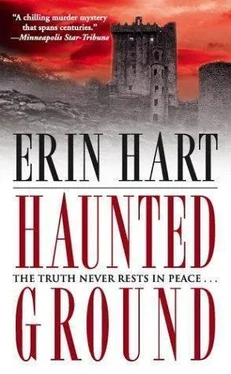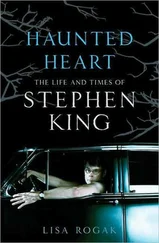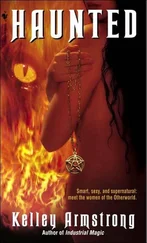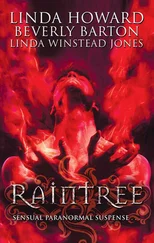The sound of voices cut short their conversation as Hugh Osborne came in with Mrs. Gonsalves. Devaney heard the voice he’d come to know on the telephone, and wondered how the woman’s grace and dignity could seem completely undiminished by the length and grim purpose of her journey. He watched her dark eyes alight upon the package in his hands.
“You must be Detective Devaney,” she said.
“You know one another?” Osborne asked.
“We’ve spoken on the telephone,” said Mrs. Gonsalves, clasping Devaney’s outstretched hand. “Detective, I’m so grateful for all you’ve done on my daughter’s behalf. And my grandson—” Her voice faltered, but her eyes were steady. Devaney held out the precious brown package.
“Thank you for returning Mina’s letters,” said Mrs. Gonsalves as she received it. “I know you understand how I treasure them.”
Devaney begged off staying for tea. He had done his duty in bringing the package. Upon reaching home, he could hear a few faint, wobbly fiddle notes as he got out of the car. Roisin was in the kitchen, tentatively picking out a tune; he could barely recognize the first few bars of “Paidin O’Rafferty.” He watched through the kitchen window as Nuala came in, kissing the top of her daughter’s studiously inclined head as she passed.
“That’s starting to sound lovely, Roisin, keep at it. Remember what Daddy said, and don’t try to play too fast. I’ve got to go out—” Nuala stopped when he opened the door. Devaney felt frozen on the threshold, couldn’t force himself to speak or to step into the house. Roisin stopped playing, and Nuala came and stood in front of him.
“Are you all right, Gar? Why are you home in the middle of the afternoon?”
He wanted to tell his wife that for the first time in a long while he could see her so clearly, so entirely, every curve and eyelash and tiny line, as clearly as that first time they had slept and awakened together, but he found himself unable to speak.
“Garrett,” she said, “why won’t you come in?” Her touch was enough to break the spell. He stepped forward and sat down facing his daughter across the table. Nuala seated herself beside him.
“Listen, Daddy, I’ve nearly got it off,” Roisin said brightly, launching into a halting jig tempo once more, barely getting through the A part of the tune.
“Isn’t she coming along?” Nuala asked, still searching his countenance for some inkling of what was going on. He felt them standing on opposite sides of a threshold, if not of understanding itself, then at least a willingness to understand one another again. Nuala reached up and touched his face. “I’m going to call the office, and ask Sheila if she wouldn’t mind taking a couple of appointments for me. I won’t be a minute.”
When Devaney looked across the table at Roisin, he saw a reflection of his own bewildered countenance in the bottomless depths of his daughter’s eyes.
The funeral Mass for Mina and Christopher Osborne took place two days later at St. Columba’s in Dunbeg. Standing in the back of the church, Devaney watched a small clutch of reporters gather outside the gates, no doubt hoping to get a few shots of the grieving family, to be served up on the evening news with some of the more sensational facts of the case, all intoned with the usual air of affected solemnity. They’d have a good show; the whole village had turned out. Hugh Osborne was already in the front of the church with Mrs. Gonsalves. Devaney suddenly realized that in their conversations, he’d never even asked Mina’s mother her Christian name. He watched the mourners shuffle slowly past: Delia Hernan, Dolly Pilkington with her three eldest, Ned and Anna Raftery, all the women he’d dubbed charter members of the Father Kinsella fan club. Una McGann and her daughter sat among them, purposely removed from Osborne, Devaney noticed, and he could see the looks from all around her that measured the distance exactly. Una’s brothers were there as well, Fintan sitting upright beside her, and Brendan kneeling in one of the back pews with his head bowed, and a rosary knotted through his thick fingers.
Devaney was still standing inside the door, wishing in vain for a cigarette, when Brian Boylan approached. Boylan was all spit and polish today in one of his expensive suits, as if he’d come here to work the crowd—and so he had, Devaney thought cynically.
“Just wanted to say well done, Detective,” Boylan said in a confidential tone. “Very well done indeed. A sad case, but good to have everything resolved.”
“Sir” was Devaney’s curt reply. He didn’t feel he deserved even this brief congratulatory nod. Though he probably would have cracked it eventually, the fact of the matter was that the bloody thing had fallen right into his lap. When are you ever going to learn to ease up? asked the voice in his head. Whatever way the answers had come, the thing was finished.
A heavy rain lashed down all during the service, and by the time the Mass was over the television cameras had dispersed. The showers had all but stopped when the mourners reached the burial site, but the sun seemed to dodge in and out behind still-threatening dark clouds that occasionally let go a sporadic drizzle. Mother and child were interred in the same casket, in a corner of the ancient churchyard at Drumcleggan Priory, in an area slightly separated from the rest of the burials. The church had been full to the rafters, but here at the priory Hugh Osborne stood solemnly by the graveside, arm in arm with Mrs. Gonsalves, and the only others in attendance were Father Kinsella, Cormac Maguire and Nora Gavin, Una and Fintan McGann, Devaney himself, and the undertaker’s men.
After the rain, the air smelled of freshly turned clay, and it struck Devaney that there was nothing illusory about this burial: no carpet of artificial turf covered the mound of earth that had been dug by hand from the grave; the unpretentious wooden coffin was lowered into the ground on stout ropes by two laboring men in shirtsleeves. Seated on a folding chair at the graveside, Fintan McGann strapped on his pipes and, when the holy water had been sprinkled and the last prayers said, lowered his head and began to play an air—a lament whose simple, dignified melody contained the purest distillation of grief. After they all filed from the churchyard, Devaney turned to watch the workmen as they shoveled the wet clay into the grave, listening to the damp, rhythmic scrape of the spades, and the sound of the soil hitting the coffin with a hollow thud.
Back at Bracklyn House after the interment, Cormac noted how the noise level dipped for the slightest fraction of a second when Hugh and Mrs. Gonsalves entered the front hall, just as it had the night he saw Osborne ducking through the door at Lynch’s pub. The mood here was decidedly somber, and yet this usually silent house took on a different, almost unrecognizable demeanor when filled with the buzz of conversation. It was clearly the first time most of these people had seen the inside of Bracklyn House, and he could see their eyes gauging its proportions, and their frank astonishment at its general state of disrepair, the age and shabbiness of the furnishings. The doors to the formal sitting room were open wide, the chandeliers managed to glitter through their thin veil of dust, and the huge dining table and sideboard were laden with plates of homemade ham and salad sandwiches, dark fruitcake, and currant scones. The combination of homeliness and grandeur struck a discordant note.
Hugh led Mrs. Gonsalves to a chair beside the dining room windows. Una brought her a cup of tea, and tried to press some refreshment on Osborne as well, which he refused. Mourners began to file past. “Sorry for your trouble,” Cormac heard them murmur in low voices as they leaned down to Mrs. Gonsalves, or solemnly shook Hugh Osborne’s hand. How strange to see the modern-day citizens of Dunbeg, whose tenant ancestors no doubt spent lifetimes tugging their forelocks in the presence of the Osbornes, greeting the current owner of Bracklyn House as though he still exerted some sort of control over their lives.
Читать дальше











